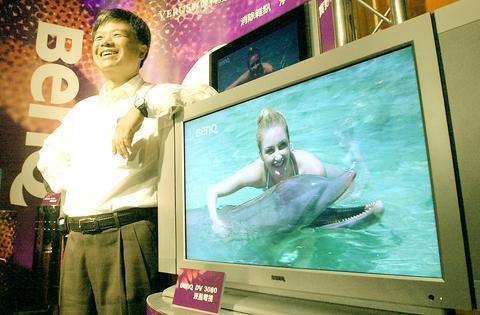BenQ Corp (
The emerging flat-screen TV business will see revenues soar to NT$10 billion next year from NT$2 billion this year, said Peter Chen (
The company yesterday rolled out three new flat-panel TV models, including one with a 46-inch screen. It expects to ship about 100,000 units of flat-panel televisions this year, with 20,000 going to Taiwanese consumers.

PHOTO: GEORGE TSORNG, TAIPEI TIMES
"The growth in that area [flat-screen TV sales] will be very strong in 2004 as we already saw rising demand from end-users," said Jerry Wang (
In addition, the broadcasting of leading European soccer competitions and the Olympic Games in Athens next year will further spur the demand for such high-resolution TVs, Wang added.
The strong demand for liquid crystal displays and optical-disk related products have allowed BenQ to report its third-quarter profits surging by 59 percent to NT$2.23 billion from NT$1.40 billion earned a year ago, the company said in a statement yesterday.
For the first nine months, profits fell to NT$5.14 billion from NT$5.97 billion a year earlier, with its earnings per share declining to NT$2.49 from NT$3.5, the statement said. BenQ will hold its investor conference today to detail its earnings report and its outlook for this quarter.
The company currently ships about 80 percent of its LCD-TVs to two international vendors, which it declined to specify, on a contract basis, while producing the remaining 20 percent for BenQ-brand TVs.
"Large-sized LCD screens will be the dominant TV screen technology this year and next year when consumers consider replacing conventional cathode-ray-tube TVs," BenQ president Sheaffer Lee (
To boost flat-screen TV sales, local home appliance makers such as Teco Electric & Machinery Co (
BenQ decided to keep itself out of the price war and its new 46-inch LCD-TVs are priced at NT$299,000 each.
"We expect to see a price reduction next year, but the price drop won't be huge. And we won't plan to participate in the price war," Chen said.
As long as the supply of large-sized LCD panel remains tight, which will keep LCD prices higher, it will leave scant room for flat-screen TV makers to lower prices, he added. AU Optronics Corp (

SEEKING CLARITY: Washington should not adopt measures that create uncertainties for ‘existing semiconductor investments,’ TSMC said referring to its US$165 billion in the US Taiwan Semiconductor Manufacturing Co (TSMC, 台積電) told the US that any future tariffs on Taiwanese semiconductors could reduce demand for chips and derail its pledge to increase its investment in Arizona. “New import restrictions could jeopardize current US leadership in the competitive technology industry and create uncertainties for many committed semiconductor capital projects in the US, including TSMC Arizona’s significant investment plan in Phoenix,” the chipmaker wrote in a letter to the US Department of Commerce. TSMC issued the warning in response to a solicitation for comments by the department on a possible tariff on semiconductor imports by US President Donald Trump’s

‘FAILED EXPORT CONTROLS’: Jensen Huang said that Washington should maximize the speed of AI diffusion, because not doing so would give competitors an advantage Nvidia Corp cofounder and chief executive officer Jensen Huang (黃仁勳) yesterday criticized the US government’s restrictions on exports of artificial intelligence (AI) chips to China, saying that the policy was a failure and would only spur China to accelerate AI development. The export controls gave China the spirit, motivation and government support to accelerate AI development, Huang told reporters at the Computex trade show in Taipei. The competition in China is already intense, given its strong software capabilities, extensive technology ecosystems and work efficiency, he said. “All in all, the export controls were a failure. The facts would suggest it,” he said. “The US

The government has launched a three-pronged strategy to attract local and international talent, aiming to position Taiwan as a new global hub following Nvidia Corp’s announcement that it has chosen Taipei as the site of its Taiwan headquarters. Nvidia cofounder and CEO Jensen Huang (黃仁勳) on Monday last week announced during his keynote speech at the Computex trade show in Taipei that the Nvidia Constellation, the company’s planned Taiwan headquarters, would be located in the Beitou-Shilin Technology Park (北投士林科技園區) in Taipei. Huang’s decision to establish a base in Taiwan is “primarily due to Taiwan’s talent pool and its strength in the semiconductor

French President Emmanuel Macron has expressed gratitude to Hon Hai Precision Industry Co (鴻海精密) for its plan to invest approximately 250 million euros (US$278 million) in a joint venture in France focused on the semiconductor and space industries. On his official X account on Tuesday, Macron thanked Hon Hai, also known globally as Foxconn Technology Group (富士康科技集團), for its investment projects announced at Choose France, a flagship economic summit held on Monday to attract foreign investment. In the post, Macron included a GIF displaying the national flag of the Republic of China (Taiwan), as he did for other foreign investors, including China-based